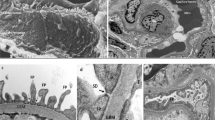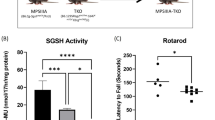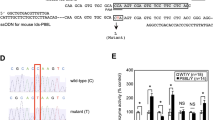Abstract
Mucopolysaccharidosis Type VII (MPS VII) is a lysosomal storage disease caused by a deficiency of the enzyme, β-glucuronidase. MPS VII has a wide variation in phenotypic expression, including presentation in the neonatal period with nonimmune hydrops fetalis. We report a neonate with MPS VII who initially presented with marked isolated ascites not associated with hydrops fetalis. This appears to be a novel finding in patients with MPS VII.
This is a preview of subscription content, access via your institution
Access options
Subscribe to this journal
Receive 12 print issues and online access
$259.00 per year
only $21.58 per issue
Buy this article
- Purchase on Springer Link
- Instant access to full article PDF
Prices may be subject to local taxes which are calculated during checkout

Similar content being viewed by others
References
Casal ML, Wolfe JH . Mucopolysaccharidosis type VII in the developing mouse fetus. Pediatr Res 2000; 47: 750–6.
Sheridan O, Wortman J, Harvey C, Hayden J, Haskins M . Craniofacial abnormalities in animal models of mucopolysaccharidoses I, VI, and VII. J Craniofac Genet Dev Biol 1994; 14: 7–15.
Nelson A, Peterson L, Frampton B, Sly WS . Mucopolysaccharidosis VII (beta-glucuronidase deficiency) presenting as nonimmune hydrops fetalis. J Pediatr 1982; 101: 574–6.
Molyneux AJ, Blair E, Coleman N, Daish P . Mucopolysaccharidosis type VII associated with hydrops fetalis: histopathological and ultrastructural features with genetic implications. J Clin Pathol 1997; 50: 252–4.
Kagie MJ, Kleijer WJ, Huijmans JG, Maaswinkel-Mooy P, Kanhai HH . Beta-glucuronidase deficiency as a cause of fetal hydrops. Am J Med Genet 1992; 42: 693–5.
Winn HN, Stiller R, Grannum PA, Crane JC, Coster B, Romero R . Isolated fetal ascites: prenatal diagnosis and management. Am J Perinatol 1990; 7: 370–3.
Gillan JE, Lowden JA, Gaskin K, Cutz E . Congenital ascites as a presenting sign of lysosomal storage disease. J Pediatr 1984; 104: 225–31.
Wenger DA, Williams C . Screening for lysosomal disorders. In: Hommes FA, editor. Techniques in Diagnostic Human Biochemical Genetics: A Laboratory Manual. New York: Wiley. 1990. pp. 587–617.
Moore TR, Tipton EE . Amniotic fluid and nonimmune hydrops fetalis. In: Fanaroff AA, Martin RJ, editors. Neonatal–Perinatal Medicine. Diseases of the Fetus and Infant. St. Louis: Anne S. Patterson. 1997. p. 312–26 (Vol. 1).
Machin GA, et al. Diseases causing fetal and neonatal ascites. Pediatr Pathol 1985; 4: 195–211.
Woodall DL, Birken GA, Williamson K, Lobe TE . Isolated fetal–neonatal abdominal ascites: a sign of intrauterine intussusception. J Pediatr Surg 1987; 22: 506–7.
Abu-Dalu KI, Tamary H, Livni N, Rivkind AI, Yatziv S . GM1 gangliosidosis presenting as neonatal ascites. J Pediatr 1982; 100: 940–3.
Daneman A, Stringer D, Reilly BJ . Neonatal ascites due to lysosomal storage disease. Radiology 1983; 149: 463–7.
Daly TM, Ohlemiller KK, Roberts MS, Vogler CA, Sands MS . Prevention of systemic clinical disease in MPS VII mice following AAV-mediated neonatal gene transfer. Gene Ther 2001; 8: 1291–8.
Vogler C, Barker J, Sands MS, Levy B, Galvin N, Sly WS . Murine mucopolysaccharidosis VII: impact of therapies on the phenotype, clinical course, and pathology in a model of a lysosomal storage disease. Pediatr Dev Pathol 2001; 4: 421–33.
Bonduelle M, Lissens W, Goossens A, et al. Lysosomal storage diseases presenting as transient or persistent hydrops fetalis. Genet Couns 1991; 2: 227–32.
Sly WS, Quinton BA, McAlister WH, Rimoin DL . Beta glucuronidase deficiency: report of clinical, radiologic, and biochemical features of a new mucopolysaccharidosis. J Pediatr 1973; 82: 249–57.
Beaudet AL, DiFerrante NM, Ferry GD, Nichols BL Jr, Mullins CE . Variation in the phenotypic expression of beta-glucuronidase deficiency. J Pediatr 1975; 86: 388–94.
Sferra TJ, Qu G, McNeely D, et al. Recombinant adeno-associated virus-mediated correction of lysosomal storage within the central nervous system of the adult mucopolysaccharidosis type VII mouse. Hum Gene Ther 2000; 11: 507–19.
Acknowledgements
We would like to thank W.B. Cumming (Department of Radiology) for his assistance with reviewing the plain films and magnetic resonance images, C.A. Williams (Division of Genetics) for his assistance with the diagnosis and outpatient management of the patient, and the Biomedical Resource Services at the University of Florida Health Science Center for preparing the photograph.
Author information
Authors and Affiliations
Rights and permissions
About this article
Cite this article
Saxonhouse, M., Behnke, M., Williams, J. et al. Mucopolysaccharidosis Type VII Presenting With Isolated Neonatal Ascites. J Perinatol 23, 73–75 (2003). https://doi.org/10.1038/sj.jp.7210844
Published:
Issue Date:
DOI: https://doi.org/10.1038/sj.jp.7210844



